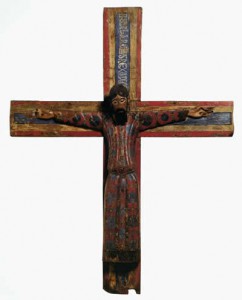
Scott Hahn with David Scott
Jesus draws a blunt picture in today’s Gospel.
The Pharisee’s prayer is almost a parody of the thanksgiving psalms (see for example Psalms 30,118). Instead of praising God for His mighty works, the Pharisee congratulates himself for his own deeds, which he presents to God in some detail.
The tax collector stands at a distance, too ashamed even to raise his eyes to God (see Ezra 9:6). He prays with a humble and contrite heart (see Psalm 51:19).
He knows that before God no one is righteous, no one has cause to boast (see Roman 3:10; 4:2). We see in the Liturgy today one of Scripture’s abiding themes—that God “knows no favorites,” as today’s First Reading tells us (see 2 Chronicles 19:7; Acts 10:34-35; Romans 2:11).
God cannot be bribed (see Deuteronomy 10:17). We cannot curry favor with Him or impress Him—even with our good deeds or our faithful observance of religious duties such as tithing and fasting.
If we try to exalt ourselves before the Lord, as the Pharisee does, we will be brought low (see Luke 1:52).
This should be a warning to us—not to take pride in our piety, not to slip into the self-righteousness of thinking that we’re better than others, that we’re “not like the rest of sinful humanity.”
If we clothe ourselves with humility (see 1 Peter 5:5-6)—recognize that all of us are sinners in need of His mercy—we will be exalted (see Proverbs 29:33).
The prayer of the lowly, the humble, pierces the clouds. Paul testifies to this in today’s Epistle, as He thanks the Lord for giving him strength during his imprisonment.
Paul tells us what the Psalmist sings today—that the Lord redeems the lives of His humble servants.
We too must serve Him willingly. And He will hear us in our distress, deliver us from evil, and bring us safely to His heavenly kingdom.
St. John Chrysostom
Homilies on Conversion, 2
A Pharisee and a tax collector went up to the Temple to pray. The Pharisee began by enumerating all his virtues, declaring: “O God, I thank you that I am not like the rest of humanity – greedy, dishonest adulterous – or even like this tax collector!”
Wretched man! Daring to cast judgement on the whole world! Why afflict your neighbour? Do you need to condemn this tax collector as well? Isn’t the earth enough for you? You accuse everyone without exception: “I am not like the rest of humanity… or even like this tax collector; I fast twice a week, I pay tithes on my whole income.” What smugness lies in these words! What a miserable creature!…
As for the tax collector, he had understood these words only too well and might have responded in kind: “Who are you, then, daring to make such unkind comments in my regard? How do you come to know anything about my life? You’ve never kept society with me, you’re not one of my close friends, so why show such arrogance? Besides, who is able to bear witness to the genuineness of your good deeds? What makes you sing your own praises like this or who is encouraging you to glorify yourself in this way?” Yet he did none of these things – quite the opposite – he cast himself on the ground, saying: “God be merciful to me, a sinner!” And because he gave proof of his humility, he went away justified.
The Pharisee left the Temple deprived of any kind of absolution, whereas the tax collector went away, his heart renewed by re-found righteousness… All the same, there was no question in this case of humility in the sense the term is used when someone of high rank lowers himself. In the case of the tax collector it was not a question of humility but of simple truth since what he said was true.
St. Gregory the Great
Homily 13 on the Gospel
“Jesus, Son of David, have pity on me!”
We must note that the blind man was enlightened while Jesus is said to be drawing near Jericho for ‘Jericho’ is interpreted as ‘moon’. In sacred scripture the moon symbolizes the weakness of our body, since as it wanes in its monthly changes it depicts the weakness of our mortal nature. The blind man came to the light when our Creator drew near Jericho, because when a divine person undertook the weakness of body the human race recovered the light that it had lost. God suffered as man and we mortals are raised up to divinity.
The humanity represented by this blind man is rightly described as sitting at the wayside and as begging. Truth himself told us: “I am the way” (Jn 14:6). Anyone ignorant of the brightness of eternal light is blind. If he already believes in his Redeemer he is “sitting at the wayside”. If he already believes but only pretends to ask for eternal light, if he refrains from praying, he is indeed a blind man sitting at the wayside… If anyone recognizes the darkness of his blindness, if anyone understands that the light of truth is wanting to him, let him cry from the bottom of his heart, let him also cry with his whole mind, let him say: “Jesus, son of David, have pity on me!”
